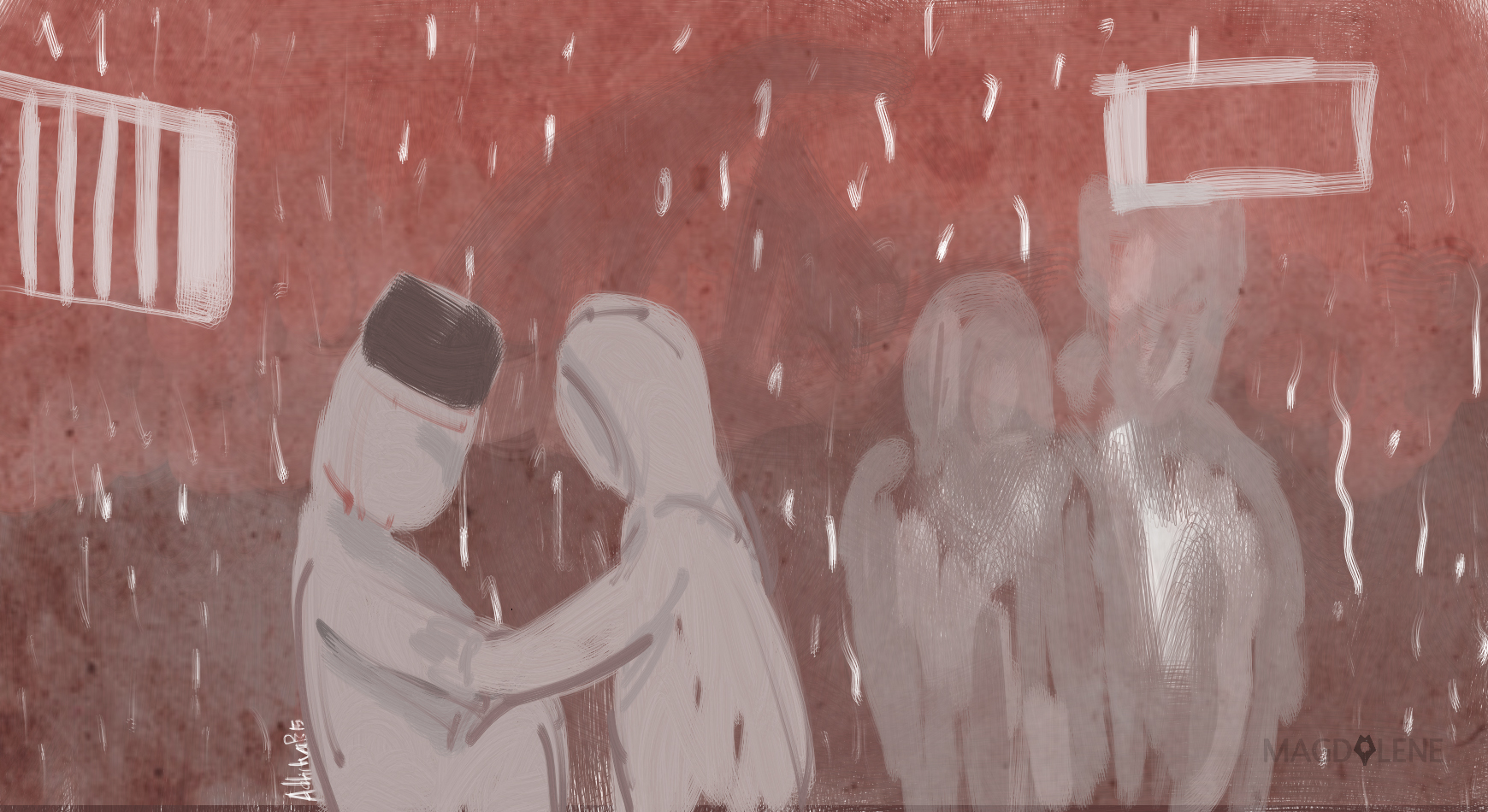“Love will come eventually,” parents say when they force their daughters to marry men they do not love.
The hall was vast, 30 meters wide on each side, with tall wooden ceilings and glistering white tile floor, smack at the back of a police compound. The East Lombok Police often used the hall for gatherings and ceremonies but this time it was a makeshift shelter for 383 people from all corners of East Lombok district, Indonesia. Faizah and her family were among the last people to be placed in the hall.
It was February 2002, and a wave of attacks had come sweeping across East Lombok with homes after homes belonging to members of the religious minority group Ahmadiyya reduced to rubbles and ashes. It would be time before Faizah’s home was next.
Faizah was a bubbly woman of 22, full of life. She was smart, friendly and sociable, while her husband Guntur was the complete opposite: quiet, reserved.
Guntur was born not an Ahmadi, but became interested in the group's spirituality and manner. He came to their mosque one day asking to convert and marry an Ahmadi woman. An Ahmadi cleric played the role of a matchmaker. Faizah’s father Nasipudin agreed to have Faizah wed to this recent convert he had never met.
During her stay at the hall, Faizah just gazed at her husband whom she barely knew. He was tall and chubby with a handsome round face and dark curly hair. His skin was fair, unlike the weather-beaten skins of others in this mostly peasant Ahmadiyya community.
Faizah wondered whether her husband Guntur would crack under pressure. A month ago he was a stranger who didn’t know how to pray and read the Quran. The other Ahmadis had years of indoctrination, enabling them to resist the systematic pressures for them to renounce Ahmadiyya. She was unsure if he would stay resolute about his decision to join Ahmadiyya. She was also uncertain if he didn’t regret his decision to marry her. He was, after all, a tall, handsome man, while she felt she was an unattractive, short, chubby woman. The fact that he hadn’t left was not enough to convince her that he was here to stay.
At the hall, there were people that the family had known all their lives. There were relatives who had moved out of Pancor, by then reunited under one roof. There were close friends. There were strangers they had never seen. There were people they met only once or twice at Ahmadiyya gatherings.
There were elderly people with pearly white hair and no teeth. There were aging men and women who were losing their eyesight from cataract. There were month-old babies who cried continuously. There were plastic mats on a cold floor, their beds for the night. There were cardboards full of instant noodles, laden with preservatives. There was no fresh, drinkable water to cook them with. There was no stove. There was no pan or cooking pot.
There were people who were so hungry they ate the noodle straight out of its colorful wrappers, uncooked. They would have diarrhea and stomachache as results. But they had no choice. It was either going to bed hungry or going to bed with a stomach pain.
The presence of 383 men, women and children made the vast hall seemed small. The heat, sweat and moisture generated from the crowd were suffocating. The buzz of chatters was unnerving, masked only by crying children and the sickly coughing of the elderly. Occasionally, babies wet their diapers, sending a foul stench across the room half-drenched in baby’s urine.
At night, gunshots were heard, followed by the sound of a mob armed with bamboo poles and wooden plank shouting and screaming. More shouting was heard and moments later the sound of pelted rocks. Police did nothing to stop the mayhem. There were towering flames illuminating the night sky with thick black smoke snaking up into the air. This would go on for days and weeks while they were there.
Faizah cried, thinking why anyone would want to ransack their homes. She was careful not to show it to her new husband whom she barely knew. “Love will eventually come,” say those forcing their children to marry those they do not love. For Faizah love has yet to come. A month ago they were strangers. His quietness would make him a stranger still to Faizah.
She must have lost sleep thinking of death. She was fearful but the promised afterlife was also appealing. She was worried of her husband. He still struggled to read the Quran, still learning how to pray. “Is there a place for him in heaven?” she probably wondered. She thought about her own devotion to God, to His command, to her own religion, to the prophet, to the messiah. She wondered whether she prayed enough to ensure her place in the afterlife. She thought whether she would be reunited with her family in heaven.
With each passing day came another wave of uncertainty. Neighbors, government officials and family members would all came as bearers of bad news, bringing words that their possessions had been looted, their houses had been smashed to bits. Rubbles and metal skeletons were all that was left. Some people acted as carriers of warnings, threatening those whose houses were still standing that they, too, would meet the same ill fate if they refused to leave Ahmadiyya.
Days of uncertainty would have its toll on the hundreds of refugees who were there. Some grew sick, others delusional. Some Ahmadiyya members would have nightmares and others utter mental breakdowns. By then, the vast hall would have appeared to have grown smaller, more and more depressing. The smell of urine and unwashed bodies were becoming stronger, more nauseating.
There were rumors: the Ahmadis shall be driven out of Lombok, forced to migrate to Qadian, the birthplace of their Indian Messiah. This would make the Ahmadiyya followers confused. They were mostly peasants and humble shop owners who never traveled out of Lombok, let alone to another country. How would they survive in a foreign land where people don’t speak their language?
Everyone was panicking. Some cried at the prospect of leaving the land they called home.
It was a bluff, false information meant to create more uncertainty in the minds of the Ahmadis. But this would send their non-Ahmadi friends and families into a panic.
The bluff was enough for Guntur’s cousin to travel all the way from Sumbawa with two other relatives. The three asked to meet Guntur and told Faizah that they wanted some privacy.
“Your family is worried about you. They want you to return to Sumbawa. Besides… why are you here anyway? What are you doing joining Ahmadiyya? Are you trying to be a saint?” Guntur’s cousin asked.
“I don’t want to be anything. I just see Ahmadiyya as good,” he replied.
Faizah ran and grabbed her husband by the arm. The family tried to stop her. Before long, it turned into a tug of war.
“This is my husband. Let go!” Faizah screamed.
“You let go! My family is worried sick about him.”
“No way! You are not taking my husband! Go and ask permission from the police who put us here.”
The cousin let go of Guntur. Without much thought, Faizah grabbed her husband and the pair ran into the hall.
That night Faizah took her husband for a private conversation. She asked him to follow her to the backyard of the compound behind the hall.
Softly she spoke: “So how do you really feel? You don’t have to go through all this hardship just because of me. My place is here with my family, with the religion I chose to believe. But you… you have the right to be happy. You have the right to be with whom you choose to live, away from fear, away from persecution.”
Guntur stood, not saying a word.
“It’s not that I’m asking for a divorce or anything. I know divorcing is a sin. But we are both trying to find a solution. If you want to join your family, it’s ok. We can separate for a while,” Faizah quizzed him again.
“No. I’ll follow you no matter what.”
Faizah was tearing up. She grabbed Guntur, locking her arms in his. She gave Guntur a good look. She felt at ease. She felt she could finally trust this man. She felt that from that moment on she could truly consider Guntur as her husband, the leader of a family she could call her own.
People said “love will come eventually.” For Faizah it took one month and a week filled with chaos, violence, destruction and the presence of three unexpected guests. Her love for Guntur had finally come.
Nivell Rayda is a journalist based in Jakarta. This article was adapted from his book This Home Was Never Mine, a true story on the religious persecution of the Ahmadiyya community in Lombok, West Nusa Tenggara.








Comments